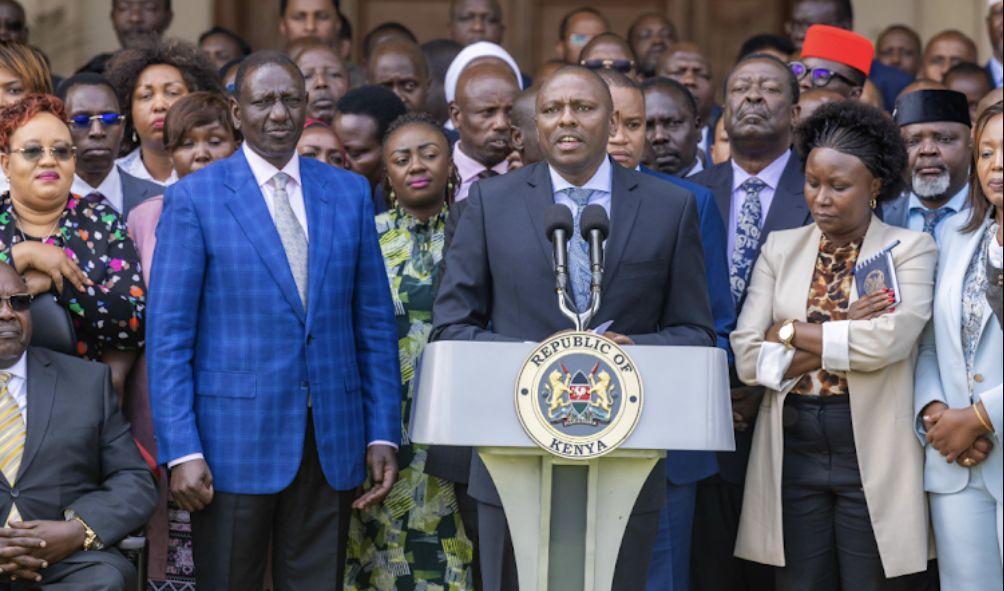Why Kenya Kwanza Backed Down on Controversial Tax Measures
Kenya Kwanza retracted several proposed tax measures, such as the 16 percent VAT on bread, after facing strong public opposition.
On Tuesday, Nairobi’s central business district was disrupted by widespread protests, leading to confrontations with police.
There were concerns that these protests could escalate nationwide, potentially damaging the economy as previous Azimio demonstrations had.
Fears that the tax proposals would damage President William Ruto’s popularity led the government to back down to calm public dissatisfaction.
The decision to yield to public pressure was influenced by a looming parliamentary standoff between Kenya Kwanza and Azimio factions.
The Azimio coalition, on Tuesday, also convened a parliamentary group meeting to rally MPs against the Finance Bill 2024.
National Assembly Minority Leader Opiyo Wandayi called the coalition MPs for a meeting on Tuesday, indicating an impending major confrontation in Parliament.
The invite by Wandayi emphasized the importance of the meeting to discuss the Finance Bill and strategize, with mandatory attendance required.
Although Raila Odinga has not explicitly called for protests over the Bill, the level of organization on Tuesday suggests that a call from the opposition could worsen the government’s situation.
Last week, Raila criticized the Finance Bill, 2024, calling its tax proposals insensitive and harsh.
Raila argued that the Bill fails essential taxation principles and would burden millions of poor Kenyans even more than the previous year’s bill.
ALSO READ:
- “Two Groups, One Agenda”: Gachagua Accuses Raila of Secret Political Deals
- Exclusive: Ida Odinga’s 75th Birthday Party in Karen (Photos)
- FKF President Discloses Exact Amount Paid to Harambee Stars Players
- Gachagua’s Ally Senator John Methu Admits Ruto Might Win 2027 Elections
- Maraga Explains Why He Hasn’t Campaigned in Kisii Despite 2027 Bid
President Ruto had initially insisted on raising more local revenue, but some tax proposals in the Finance Bill, 2024, sparked public outcry.
Proposals opposed by both the informal and formal sectors, including business people, were seen as harmful to the local economy.
Some Kenya Kwanza MPs also opposed the Bill, citing their constituents’ instructions to vote against it.
Deputy President Rigathi Gachagua’s actions within his Mount Kenya base posed additional threats to the Bill’s passage.
The combined opposition from Azimio and some Kenya Kwanza MPs threatened to delay the crucial revenue-raising Bill.
The Bill needs to be passed and enacted into law for the government to impose any new tax measures.
The Finance Bill, 2024, must be approved before July 1 to start the 2024/25 budget cycle.
Without the Bill’s approval, the government would face a financial crisis without a budget.
In a delicate move to maintain balance within Kenya Kwanza, the government dropped several proposed revenue-raising measures to appease the public.
ALSO READ: President Ruto Announces 16 Key Amendments to Controversial Finance Bill 2024(LIST)
“We have listened to you through the committee,” stated National Assembly Majority Leader Kimani Ichungw’ah.
The Bill is scheduled for its Second Reading on Wednesday and Thursday, with voting expected next week.
“We will allow the weekend for any amendments to the Bill,” added Ichungw’ah.
After a lengthy meeting at State House, Molo MP Kimani Kuria announced that some proposals had been removed from the Bill.
The dropped proposals include the 16% VAT on bread, Excise duty on vegetable oil, VAT on sugar transportation, a 2.5% Motor Vehicle Tax, and the Eco Levy on locally manufactured products.
The eTims requirement was removed for farmers and small businesses with turnovers below Sh1 million, while Excise duty was added to imported table eggs, onions, and potatoes to protect local farmers.
The government also scrapped the increase in mobile money transfer tax and VAT on financial services and foreign exchange transactions.
The VAT registration threshold was raised from Sh5 million to Sh8 million, meaning many small businesses no longer need to register for VAT.
Why Kenya Kwanza Backed Down on Controversial Tax Measures
